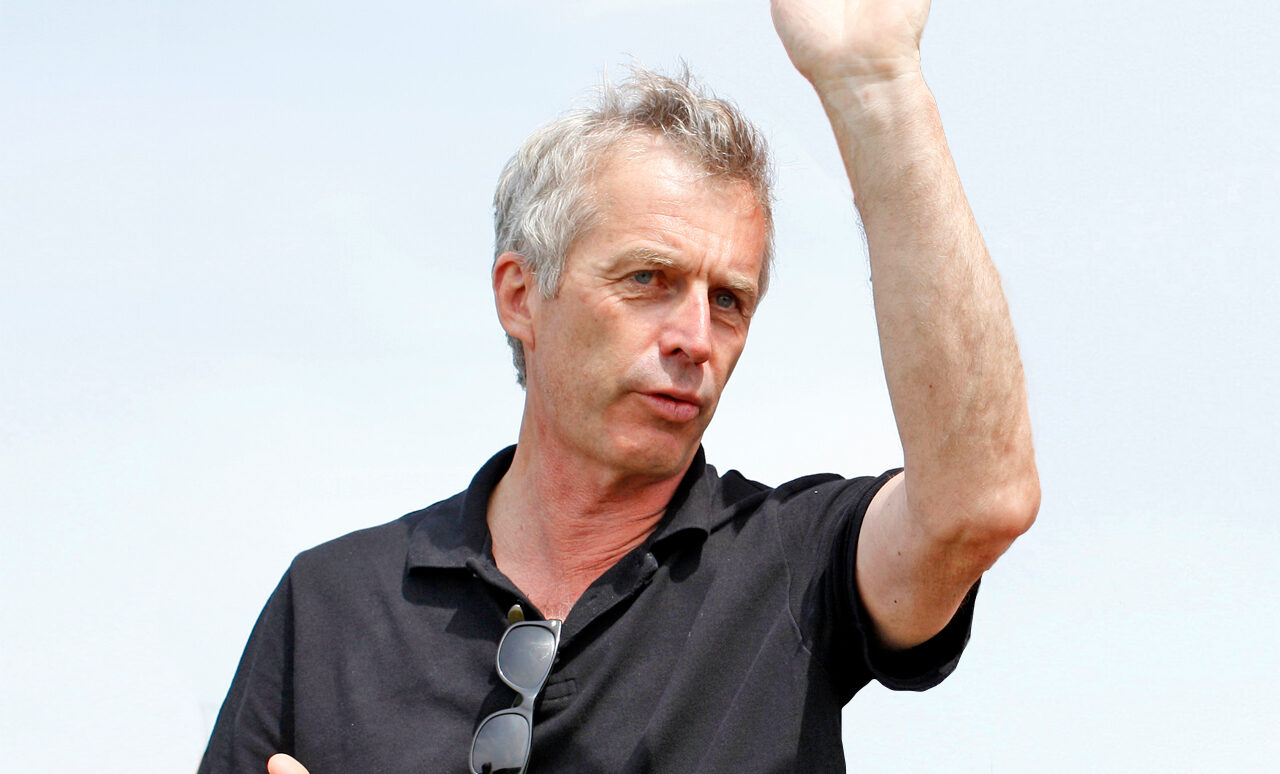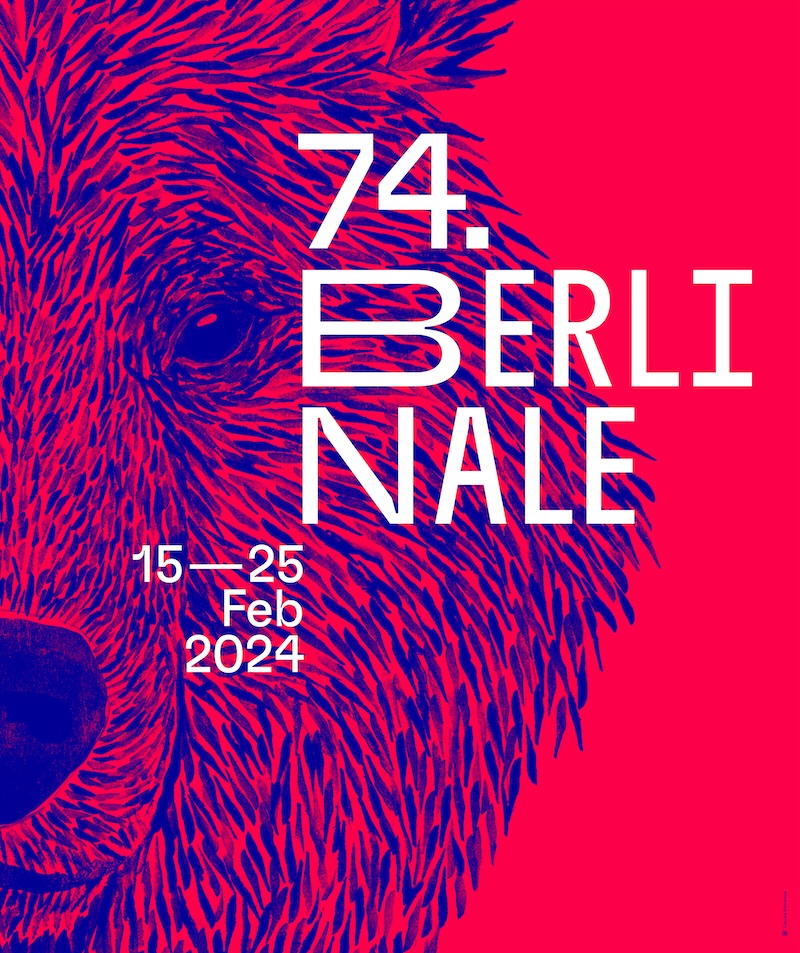“It’s the incarnation that I’m interested in, not mockery”: Bruno Dumont on The Empire at Berlinale 2024

The first ever sci-fi film was made in France, with 1905’s Le voyage dans la lune (A Trip to the Moon). More than a century and various Star Trek, Star Wars, Alien and Predator franchises later, it’s the Americans who dominate the genre. Acclaimed French auteur Bruno Dumont has turned his wandering gaze on science fiction, creating a brilliantly weird mashup that combines elements of Hollywood space opera and French naturalistic cinema, if not quite reclaiming the genre for the French. Just don’t call it a parody.
L’Empire details the ongoing struggle between two warring space factions who bring their final conflict to earth – or a sleepy fishing village in Normandy to be precise. Continuing Dumont’s style of working with both known and lesser-known actors, the film stars French acting legend Fabrice Luchini and Camille Cottin, whose profile in the English-speaking world has skyrocketed after Call My Agent became an international hit on Netflix. We talked to Dumont before the movie’s launch at the 2024 Berlinale.
You have your own distinctive style, but how did you transplant this to what’s such a distinctive genre?
My universe is known, but I wanted to renew it, to rejuvenate it in a certain way. So I looked a bit on the other side, and the other side might be a certain kind of American cinema, space opera, and actually these two different cinema genres – the European naturalistic and the American bombastic – you don’t mingle them usually. But that’s exactly what I wanted to do, because actually, these two cinemas talk about the same things, just in opposite ways. So, I thought why not confront them and see what happens?
Some of the early press for the film has described it as a parody. Do you agree with this assessment?
I don’t agree with that; it’s not a parody, and I’m not actually mocking – neither the universe nor the characters. Take the spaceships: they are very seriously conceived and there’s no irony in those spaceships. Just to mock yourself about this story would have been too easy, and if you take somebody like (the character of) Jane – she’s coming from space and going down to earth, but I dealt with this also in a very serious way. And of course, the clash between the civilisations might seem bizarre when she comes down to earth, but then again, there’s no mockery in it, and she becomes more and more human, and more sensitive. So it’s the incarnation that I’m interested in, not mockery.
The visual imagery is truly unique. How did you determine the look of the film?
Well, you know, American cinema is full of stereotypes, especially if you look at the space opera genre: it’s always the same spaceships, always the same cockpits, always the same interiors, so what I wanted to do was create new spaceships, and renew the genre a little bit, the imagery. I got an architect to help me, and I took some examples from European architecture – like the church Sainte-Chapelle in Paris, or castles in Italy, in Naples – to renew the genre. And then Luchini, for example, the costume he’s in, Fabrice Luchini, is a costume of Dom Juan that the actor Louis Jouvet was wearing in the 1940s. So with this costume already, he’s doing something, it defines him in a certain way. The same for Jane: she has the costume of a superwoman. Or (the character of) Line: she’s wearing a wig, she looks like a blonde bimbo. So I don’t want to tell the actors in a psychological way where the character comes from, but I think the character is defined by the costume. So once they’re in the costume, that’s about it – then they just go.
It seems the depiction of good versus evil is clear in the space-set scenes, but less clear in the Earth-set scenes. Was this deliberate?
That’s exactly the point. With humans, you can’t really see what is good, what is bad, what are the borders between the two – so it’s not easy. In space, it’s all clear. In space you see the good, the bad, you see a clear distinction between the two, but it becomes too complicated when they come down from space to Earth, because then the humans are part of the game, and then another element comes, and it’s love. That complicates everything. This is what European naturalistic cinema tries to do; it tries to talk about this problem, but it’s not easy to see what’s good, what’s bad. And then you have American cinema, where everything is easy. You know exactly who’s good, you know exactly who’s bad. It’s all fake, it’s all superficial – but it’s easy to distinguish.
Why did you choose to stage the final battle between good and evil in a small French fishing village?
I’m always shooting at the same spot in the north of France because I know them, I live next to them, I know the landscape, I know the people, the people have a certain dialect, a certain accent. They have certain faces that are very expressive, so I shoot something that I know. I need a certain kind of harmony also: cinema is about harmony and so you can do something very exciting with a very simple landscape by just filming it, by putting a camera on it, because a camera adds something to it. The more normal and common somebody seems when you film them also as a person, the more extraordinary they might become on the big screen by being filmed. So that’s one of the reasons why I’m always returning to the same kind of place to shoot my films.
The sound design is impressive, as well as being really important to the atmosphere the film creates. How much work went into creating it?
There’s a big paradox. I’m actually shooting with direct sound, but then again, I’m adding sounds in the editing room. The sound that you hear in the film applies to certain rules, to certain melodies, to certain musical rules also, and it’s sometimes very discrete, that you can hardly notice it – but it’s there. I think the soundtrack adds something to the images that the images themselves don’t have. It adds a certain kind of depth to the images, and for example, with the spaceships – of course, I thought you cannot just put Bach as music, that would be too simple. I kind of forbade myself from using it, but then I put the music of Bach into a sound machine and layered it, and that again gave us the possibility to use it in a very subtle way that your ears can hardly notice it, but there is music. Since I’m my own editor – I edit my films myself – I’m really looking in the editing room at how it’s the human brain that connects things, even if you’re really not aware of them. But the soundtrack is always there to give a certain three-dimensional depth also to the imagery.
Do you write your screenplays with particular actors in mind?
The only one I really wrote the part for was Fabrice Luchini. All the others, I didn’t have them in mind. And I’m not really interested in if they’re professional actors or non-professional actors. I direct them all the same way, and I’m rather interested in who they are, not what they represent – where they come from, and what their job is. So I treat everybody in an equal way, and I’m not really directing them, because I have a very particular style.
All the actors wear an earpiece, and while shooting, I give them instructions. So I’m not really repeating a lot before. I’m shooting a scene once, then I’m just adding something to the way they played it, or I’m taking something away. In the editing room, I need different layers – I call them colours; colours of playing. Like when Jane, for example, has to cry, I told the actress, “Okay, once you cry really hard, once you cry a little bit, and once you don’t cry at all.” Because I don’t know when shooting what will be the best. There’s such an energy on a film set that you can’t know. It’s in the editing room that you decide.
With somebody like Luchini, he’s very disturbed by this kind of directing, because then he says to me, “Why didn’t you tell me if I was good?” And I answer him, “Because I don’t know.” And then somebody like Luchini, he can’t really deal with it – it’s a problem for him.
Oliver Johnston
Image: R Arpajou/Tessalit Productions
The Empire does not have a UK release date yet.
Read more reviews from our Berlin Film Festival 2024 coverage here.
For further information about the event visit the Berlin Film Festival website here.

























Facebook
Twitter
Instagram
YouTube
RSS